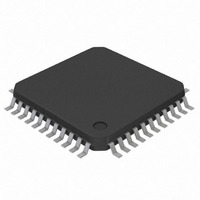PIC16F884-I/PT Microchip Technology, PIC16F884-I/PT Datasheet - Page 208

PIC16F884-I/PT
Manufacturer Part Number
PIC16F884-I/PT
Description
IC PIC MCU FLASH 4KX14 44TQFP
Manufacturer
Microchip Technology
Series
PIC® 16Fr
Datasheets
1.PIC16F616T-ISL.pdf
(8 pages)
2.MCP1631RD-MCC2.pdf
(328 pages)
3.PIC16F882-ISS.pdf
(16 pages)
4.PIC16F882-ISS.pdf
(36 pages)
5.PIC16F883-ISO.pdf
(288 pages)
Specifications of PIC16F884-I/PT
Program Memory Type
FLASH
Program Memory Size
7KB (4K x 14)
Package / Case
44-TQFP, 44-VQFP
Core Processor
PIC
Core Size
8-Bit
Speed
20MHz
Connectivity
I²C, SPI, UART/USART
Peripherals
Brown-out Detect/Reset, POR, PWM, WDT
Number Of I /o
35
Eeprom Size
256 x 8
Ram Size
256 x 8
Voltage - Supply (vcc/vdd)
2 V ~ 5.5 V
Data Converters
A/D 14x10b
Oscillator Type
Internal
Operating Temperature
-40°C ~ 85°C
Processor Series
PIC16F
Core
PIC
Data Bus Width
8 bit
Data Ram Size
256 B
Interface Type
MSSP/EUSART
Maximum Clock Frequency
20 MHz
Number Of Programmable I/os
35
Number Of Timers
3
Operating Supply Voltage
2 V to 5.5 V
Maximum Operating Temperature
+ 85 C
Mounting Style
SMD/SMT
3rd Party Development Tools
52715-96, 52716-328, 52717-734
Development Tools By Supplier
PG164130, DV164035, DV244005, DV164005, PG164120, ICE2000, DM164120-2
Minimum Operating Temperature
- 40 C
On-chip Adc
14-ch x 10-bit
Package
44TQFP
Device Core
PIC
Family Name
PIC16
Maximum Speed
20 MHz
Lead Free Status / RoHS Status
Lead free / RoHS Compliant
For Use With
XLT44PT3 - SOCKET TRAN ICE 44MQFP/TQFPAC164305 - MODULE SKT FOR PM3 44TQFP444-1001 - DEMO BOARD FOR PICMICRO MCU
Lead Free Status / Rohs Status
Lead free / RoHS Compliant
Available stocks
Company
Part Number
Manufacturer
Quantity
Price
Company:
Part Number:
PIC16F884-I/PT
Manufacturer:
VISHAY
Quantity:
2 300
Company:
Part Number:
PIC16F884-I/PT
Manufacturer:
Microchip Technology
Quantity:
10 000
Part Number:
PIC16F884-I/PT
Manufacturer:
MICROCHIP/微芯
Quantity:
20 000
- PIC16F616T-ISL PDF datasheet
- MCP1631RD-MCC2 PDF datasheet #2
- PIC16F882-ISS PDF datasheet #3
- PIC16F882-ISS PDF datasheet #4
- PIC16F883-ISO PDF datasheet #5
- Current page: 208 of 328
- Download datasheet (6Mb)
PIC16F882/883/884/886/887
13.4.16.2
During a Repeated Start condition, a bus collision
occurs if:
a)
b)
When the user de-asserts SDA and the pin is allowed
to float high, the BRG is loaded with SSPADD<6:0>
and counts down to 0. The SCL pin is then de-asserted,
and when sampled high, the SDA pin is sampled.
FIGURE 13-24:
FIGURE 13-25:
DS41291F-page 206
A low level is sampled on SDA when SCL goes
from low level to high level.
SCL goes low before SDA is asserted low, indi-
cating that another master is attempting to trans-
mit a data ’1’.
SDA
SCL
BCLIF
RSEN
S
SSPIF
SDA
SCL
RSEN
BCLIF
S
SSPIF
Bus Collision During a Repeated
Start Condition
BUS COLLISION DURING A REPEATED START CONDITION (CASE 1)
BUS COLLISION DURING REPEATED START CONDITION (CASE 2)
SCL goes low before SDA,
Set BCLIF, release SDA and SCL
T
BRG
Sample SDA when SCL goes high,
If SDA = 0, set BCLIF and release SDA and SCL
If SDA is low, a bus collision has occurred (i.e, another
master is attempting to transmit a data ‘0’, see
Figure 13-24). If SDA is sampled high, the BRG is
reloaded and begins counting. If SDA goes from high-
to-low before the BRG times out, no bus collision
occurs because no two masters can assert SDA at
exactly the same time.
If SCL goes from high-to-low before the BRG times out
and SDA has not already been asserted, a bus collision
occurs. In this case, another master is attempting to
transmit a data ‘1’ during the Repeated Start condition
(Figure 13-25).
If at the end of the BRG time-out, both SCL and SDA are
still high, the SDA pin is driven low and the BRG is
reloaded and begins counting. At the end of the count,
regardless of the status of the SCL pin, the SCL pin is
driven low and the Repeated Start condition is complete.
T
Cleared in software
© 2009 Microchip Technology Inc.
BRG
Interrupt cleared
in software
‘0’
‘0’
‘
0
’
Related parts for PIC16F884-I/PT
Image
Part Number
Description
Manufacturer
Datasheet
Request
R

Part Number:
Description:
IC PIC MCU FLASH 4KX14 40DIP
Manufacturer:
Microchip Technology
Datasheet:

Part Number:
Description:
IC PIC MCU FLASH 4KX14 44QFN
Manufacturer:
Microchip Technology
Datasheet:

Part Number:
Description:
IC,MICROCONTROLLER,8-BIT,PIC CPU,CMOS,LLCC,44PIN,PLASTIC
Manufacturer:
Microchip Technology
Datasheet:

Part Number:
Description:
IC,MICROCONTROLLER,8-BIT,PIC CPU,CMOS,DIP,40PIN,PLASTIC
Manufacturer:
Microchip Technology
Datasheet:

Part Number:
Description:
IC,MICROCONTROLLER,8-BIT,PIC CPU,CMOS,TQFP,44PIN,PLASTIC
Manufacturer:
Microchip Technology
Datasheet:

Part Number:
Description:
Manufacturer:
Microchip Technology Inc.
Datasheet:

Part Number:
Description:
IC MCU FLASH 4KX14 EEPROM 18DIP
Manufacturer:
Microchip Technology
Datasheet:

Part Number:
Description:
IC MCU FLASH 4KX14 EEPROM 18SOIC
Manufacturer:
Microchip Technology
Datasheet:

Part Number:
Description:
IC MCU FLASH 4KX14 EEPROM 20SSOP
Manufacturer:
Microchip Technology
Datasheet:

Part Number:
Description:
IC MCU FLASH 4KX14 EEPROM 28QFN
Manufacturer:
Microchip Technology
Datasheet:

Part Number:
Description:
IC MCU FLASH 4KX14 EEPROM 18DIP
Manufacturer:
Microchip Technology
Datasheet:

Part Number:
Description:
IC,MICROCONTROLLER,8-BIT,PIC CPU,CMOS,LLCC,28PIN,PLASTIC
Manufacturer:
Microchip Technology
Datasheet:

Part Number:
Description:
IC PIC MCU FLASH 4KX14 18SOIC
Manufacturer:
Microchip Technology

Part Number:
Description:
IC MCU FLASH 4KX14 EEPROM 18SOIC
Manufacturer:
Microchip Technology
Datasheet:

Part Number:
Description:
IC,MICROCONTROLLER,8-BIT,PIC CPU,CMOS,SSOP,20PIN,PLASTIC
Manufacturer:
Microchip Technology
Datasheet:











